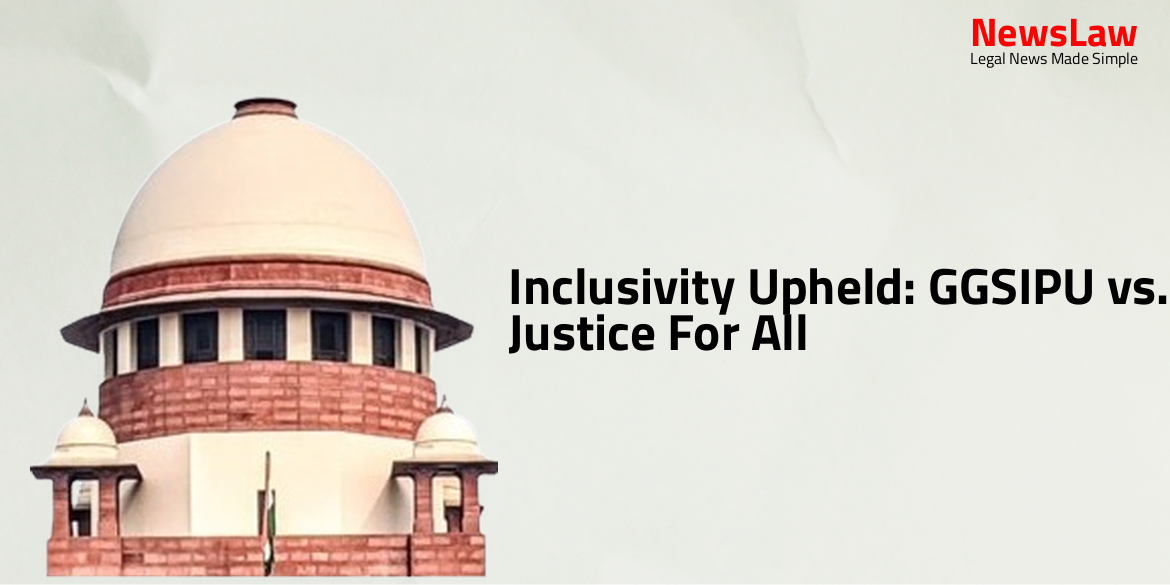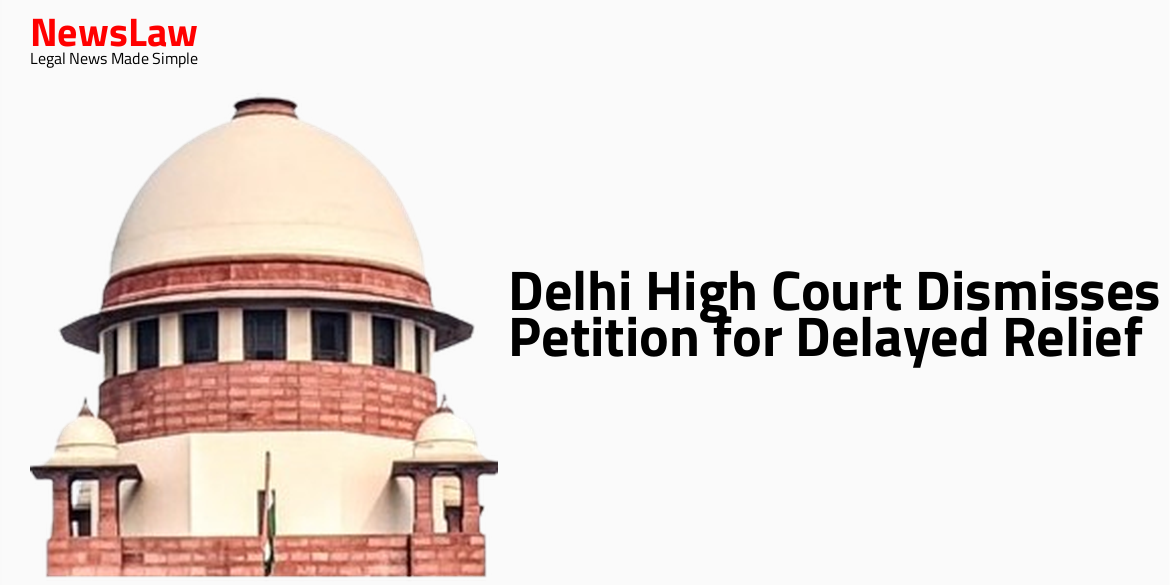In a significant legal battle between Guru Gobind Singh Indraprastha University (GGSIPU) and Justice For All, the Delhi High Court has issued a judgement emphasizing inclusivity and equal opportunities for individuals with disabilities. This case sheds light on the importance of upholding the rights of marginalized communities and ensuring access to education for all. Let’s delve into the details of this crucial ruling.
Facts
- Justice For All (JFA), a non-governmental organization run by the petitioner’s father, instituted WP (C) 6605/2023 as a PIL before the court.
- The complaint was against Guru Gobind Singh Indraprastha University (referred to as the GGSIPU) for not providing the required 5% reservation to persons with disabilities as mandated by the 2016 RPWD Act.
- The petitioner was granted admission to the Delhi Public School, Rohini based on a report from a child psychologist recommending facilitative measures.
- The child psychologist’s evaluation classified the petitioner as suffering from Mild Mental Retardation (Mild MR), following guidelines from the CBSE.
- The GGSIPU was accused of still following the repealed 1995 PWD Act, which offered a lower reservation percentage of 3% only for persons with physical disabilities.
- The 2016 RPWD Act was noted for its inclusivity, extending reservation benefits to individuals with intellectual disabilities as well.
- A contempt application was filed when GGSIPU allegedly did not implement the interim directions given by the court to provide reservation to PWD candidates in accordance with the 2016 RPWD Act.
- The Division Bench disposed of the contempt application as the University was providing 5% reservation to specially abled persons in compliance with the RPWD Act.
- The State Government and University were directed to ensure that 5% reservation is provided in all educational institutions for specially abled persons.
- The Respondent was instructed to fill up the reserved seats for specially abled persons for all categories.
- No further orders were required in the PIL as GGSIPU was directed to provide 5% reservation to specially abled persons under the RPWD Act.
Arguments
- Mr. Khagesh Jha, counsel for the petitioner, argues that Clauses 9.3 and 9.6 of the Admission Brochure, along with Section 12(2)(c) of the DPCIA, provide 3% reservation for PWDs in self-financing institutions affiliated with GGSIPU.
- The GGSIPU stated that the 2016 RPWD Act applied only to government and aided institutions, not to self-financing institutions like GGSIPU, governed by DPCIA and DPCIR.
- The petitioner is identified as a PWD under both the 1995 PWD Act and the 2016 RPWD Act.
- Section 12(2)(c) of the DPCIA is emphasized by Mr. Jha as not being rendered meaningless if interpreted to include reservation for PWDs in unaided institutions.
- The ARC, designated agency, and cancellation of registration are defined under the DPCIA.
- The petitioner’s eligibility and reservations based on disabilities are contested through various communications and evaluations.
- Various laws and rules, including the 1995 PWD Act, 2016 RPWD Act, and DPCIR, are referenced in the arguments for the petitioner’s reservation entitlement.
Analysis
- The DPCIA provisions apply to unaided institutions affiliated with GGSIPU but not government institutions.
- The reservation for PWD category should be in accordance with the Delhi Professional Colleges or Institutions Act 2007 and Rules 2007.
- The petitioner, a PWD candidate, is entitled to benefit under Section 12(2)(c) of the DPCIA and Rule 8(2)(c) of the DPCIR.
- The Division Bench’s orders in WP(C) 6605/2023 are only applicable within the parameters of the 2016 RPWD Act.
- The petitioner, despite being a PWD, is not entitled to reservation under the 2016 RPWD Act due to VIPS being a self-financed institution.
- The GGSIPU is providing 5% reservation to PWDs in accordance with the 2016 RPWD Act in Government institutions but not in self-financing institutions like VIPS where the petitioner was admitted.
- The DPCIA and DPCIR should be followed for admissions in self-financing institutions.
- The petitioner’s possession of a Disability Certificate certifies him as a person with a disability according to the 2016 RPWD Act and the 1995 PWD Act.
- Reservation policies apply differently in government colleges, self-financing institutions, and minority institutions as per the Admission Brochure.
- The petitioner’s admission as a PWD candidate in VIPS is in line with the Admission Brochure.
- Section 39 of the 1995 PWD Act applies to Government and aided institutions, whereas DPCIA applies to unaided institutions.
- The DPCIA contains reservations for PWDs, but it cannot be interpreted to apply only to Government or aided institutions.
- The GGSIPU tried to enforce requirements for Disability Certificate documentation, which was deemed unjustified.
- The petitioner’s change of category from EWS to PWD was questioned, but it was not a valid ground for admission cancellation.
- The GGSIPU was instructed by the Court to provide reservation to PWDs in accordance with the 2016 RPWD Act.
- The GGSIPU’s insistence on producing documents for Disability Certificate was deemed illegal.
- The GGSIPU’s objection to the petitioner’s admission in two colleges was not raised before the Court by their counsel.
- The Division Bench’s view on Ordinance 30’s relevance was contested, asserting the validity of the petitioner’s admission in VIPS as a PWD candidate.
- The petitioner is entitled to reservation benefits as a PWD in self-financing institutions under the DPCIA and DPCIR.
- The Admission Brochure of GGSIPU and emphasizing the reservation policy for different types of institutions was highlighted.
- The Government of NCT of Delhi’s reservation policy was specified for different categories of institutions.
- The petitioner’s eligibility for claiming reservation under the 2016 RPWD Act was examined.
- The specific part of the judgement (STA) is related to the implementation of Ordinance 30, which aims to provide special provisions for the advancement of weaker sections of society.
- Under this ordinance, affiliated colleges are required to reserve a certain percentage of seats for persons belonging to Scheduled Castes and Scheduled Tribes.
- The reservation policy outlined in Ordinance 30 is crucial for promoting the representation and empowerment of marginalized communities in educational institutions.
- This part of the judgement emphasizes the importance of affirmative action and inclusivity in higher education.
- The admission of the petitioner to the five years integrated BA LLB and BBA LLB courses in VIPS is in accordance with the law and the reservation available to PWDs.
- The objection raised by GGSIPU regarding the petitioner originally applying as an EWS candidate is not considered valid grounds to cancel the petitioner’s candidature.
- It is established that the petitioner is a candidate suffering from intellectual disability.
Decision
- The impugned communications dated 5 September 2023 and 6 September 2023 are quashed and set aside.
- The petitioner is held eligible for PWD reservation for admission to the five year integrated BA LLB and BBA LLB courses in VIPS.
- Applications related to the petitioner’s ineligibility for PWD reservation no longer stand for consideration and are disposed of.
- The writ petition is allowed with no CM APPL. 47177/2023 and CM APPL. 25829/2024 38.
- The petitioner is entitled to all consequential benefits.
- The admission of the petitioner is deemed regular.
Case Title: SARTHAK JHA Vs. GOVT OF NCT OF DELHI AND ORS (2024:DHC:4246)
Case Number: W.P.(C)-12027/2023



